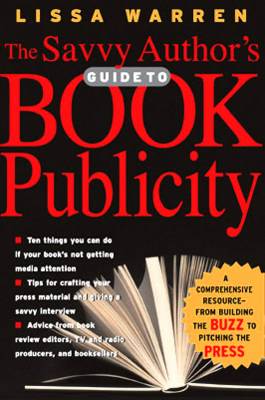
BOOKS/WRITERS
Writers Bloc series
Featured columnist: Lissa Warren
"Secrets of a Publicist"
Here's the deal -- sure, the publicity department is supposed to be pushing your book -- but they're also working on about 50 other releases.
Now what? You grab a coffee and flip through the morning paper, fuming to yourself about publicity's utter lack of interest in your latest chef-d'oeuvre. Which is kind of a waste. Because a fantastic opp to publicize your book is right there under your nose (see secret #4).
When I'm working on a book and it just isn't getting coverage, there are certain steps I take, and certain steps I ask my authors to take.
Here are ten of them:
1. Honestly assess your book's media potential.
Has it been done before? Is there lots of competition? While you're at it, assess your own media potential.
Are you regarded as an expert in your field? If yours is a science book, are you a scientist? If yours is a book about medicine, are you a doctor?
If yours is a business book, are you a CEO at a big corporation? If not, you're likely to find it hard to get interviews. A writer does not an expert make - unless, of course, it's a book about writing.
Could you be overexposed? Could your topic be overexposed? If you've written a book about dot coms or Enron, or a book about boys or mean girls, you're bound to find it a bit of a tough go.
But remember, media isn't the only way to make people notice your book.
2. Write an op-ed tied to your book.
When it runs, send it out to all of the broadcast media you've been targeting.
3. Try to get interviewed for something other than your book.
Not having any luck getting the media to talk with you about your title? See if you can interest them in speaking with you about another topic.
For example, if your book focuses on how to lose weight, see if you can get your local paper to do a piece about your award-winning sugar cookies. Tell them about the irony so that they give a nod to your book.
Or, if your book is about your memories of high school football but it's baseball season, try to get a sports radio station to have you on to talk about the joys of high school
4. Go read the newspaper or listen to NPR.
Try to find current events to which you can gear your pitch.
If your book is about job-interview techniques and the latest unemployment figures just came out (and have risen), you've got a new hook.
If your book is a guide to Atlanta and it's about to be named a top-ten city, call up USA Today's "Destinations & Diversions" section and ask whether they want to interview you for a sidebar to run alongside the rankings.
5. Look for other books on the same topic as yours.
Two books equal a trend, and reporters love to do trend pieces. For example, in the spring of 2002, we published a book called "Linked: The New Science of Networks."
Around the same time, Norton published another book about networks, "Nexus."
By calling this to the attention of science reporters, we were able to get more coverage than we could have gotten with our book alone.
Another example: In June of 2002, the "New York Times" ran a big piece about perimenopause that included a bunch of books on the subject along with info on various estrogen supplements.
6. Take a long, hard look at your press material.
Is it too hypey? Does it seem outdated in the light of current events? If it's skewed heavily to one section of your book, could you redo it to skew to another section in which the media might take more interest?
It's also important to get someone else's take on your press material.
While it's true that no one knows your book -- or you -- the way you do, it's important to get feedback that provides outside perspective.
7. Assess whether you're targeting the right kind of media.
Are you going for media that's too highbrow (or lowbrow) for your book? Are you wasting time trying to get reviews in major-market papers?
(If your book is self-help, health, parenting, new-age, or very technical, the answer is probably "yes"; but don't lose heart -- those kinds of books are great for off-the-book-page coverage.)
Are you focusing on long-lead time magazines after your book is already out?
If so, it's probably too late for them; go for the weekly mags instead.
Be honest with yourself: Do you have the right "sound" for radio? The right "look" for TV?
8. Look for new media outlets to approach, especially in your city.
* For instance, have you exhausted the following local affiliates: NPR, CBS, ABC, NBC, PBS, Fox?
* Have you tried the alumni magazine for your college and your grad school? Have you tried your hometown paper for a "local boy makes good" article?
* Have you tried all the magazines to which you subscribe?
* To get more ideas, have you gone to a newsstand?
* Have you approached the websites you surf on a regular basis?
* What about the drive-time shows on your local FM and AM stations? To find them, just go to Google.com and type in the name of your city with the word "radio" next to it.
9. Evaluate the way you're approaching the media.
Are your emails not getting answered?
Try phoning the media instead.
Are your phone messages being ignored?
Try emailing or faxing.
10. Determine whether you're using all your ammo.
* Are you including quotes from your reviews and copies of other coverage?
* Are they presented in an impressive way (in a folder or in color)?
* Does your bio list the shows you've done and the groups for which you've spoken?
* If you're touring, does it clearly state the venues where you're speaking so that each city's media know there's a local hook?
Any one of these ten steps can help you save your book, and help you get it the attention it deserves.
Like all of the tips in "The Savvy Author's Guide to Book Publicity," they're meant to encourage you to think like the pros.
But the most important thing is to keep a positive attitude. You are, after all, a published author; you've already accomplished what very few have done. Good luck as you embark on this journey. May it be meaningful, and fun.
Bio: Lissa Warren has worked in the publicity department of several prestigious Boston publishing houses including David R. Godine, Houghton Mifflin, and Perseus Publishing, and is currently Senior Director of Publicity at Da Capo Press, a member of the Perseus Books Group.

About this book: Excerpted from "The Savvy Author's Guide to Book Publicity" by Lissa Warren. Copyright © 2004 by Lissa Warren and published by Carroll & Graf Publishers, an imprint of the Avalon Publishing Group. Used with permission.
RELATED EXTRAS: BONUS CHAPTER
"Seven questions NOT to ask your publicist"
Read it here.
Find additional books/writers content in the DEC/JAN issue of "Arte Six."
Original post date: "Arte Six," JULY 2004

<< Home